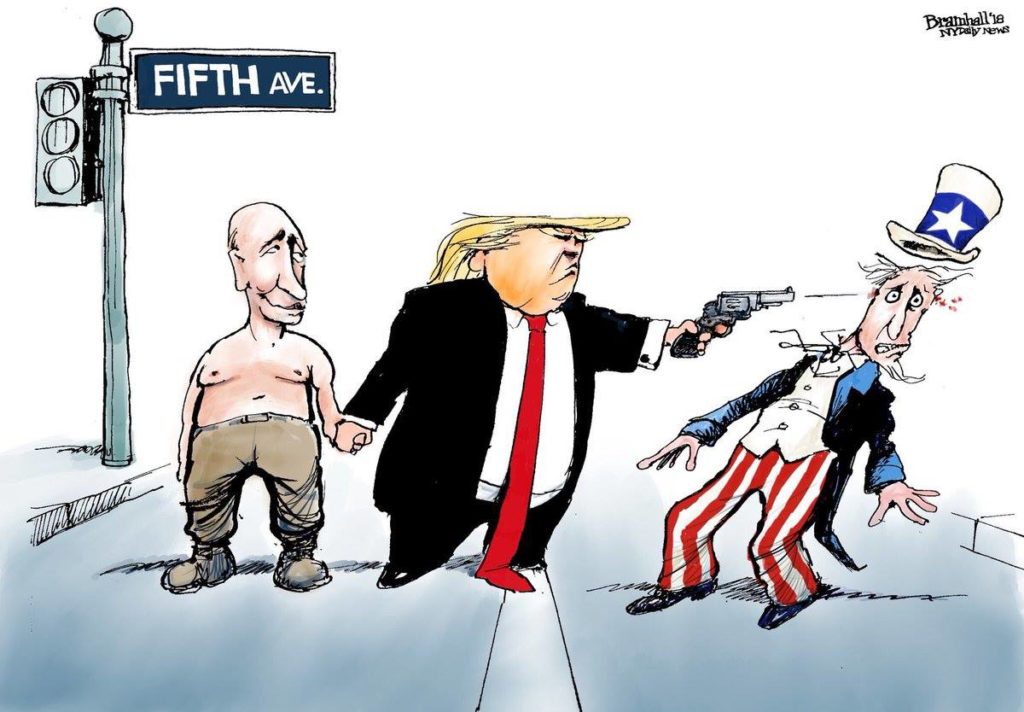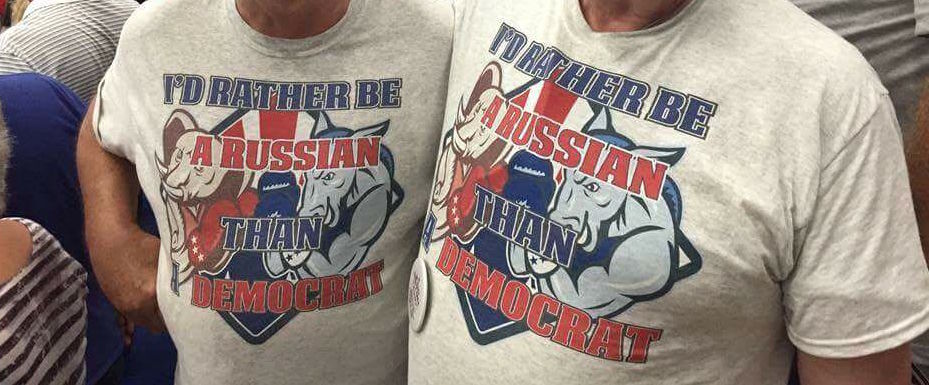The day after Donald Trump’s by now-infamous Helsinki press conference with Russian president Vladimir Putin, as pundits and policy wonks alike were going apoplectic on the morning talk shows about what was said – and what wasn’t – about the leaders’ two-hour private meeting beforehand – there was a telling moment on C-Span’s daily call-in show Washington Journal
A C-SPAN caller just thanked Russia for "interfering in our elections" pic.twitter.com/wyIBSGc3S0
— jordan (@JordanUhl) July 16, 2018
Mary Lou from Connecticut’s call to thank Russia for interfering in the election is interesting for two reasons: firstly, until she was cut off, her entire call was about Hillary Clinton; and secondly it gave voice to an attitude of the ‘ends justifying the means’ that seems to have become increasingly mainstream among Trump supporters.
(She also blamed Hillary for her husband’s marital indiscretions, apparently indifferent to any similar accusations against the current president – but like much political discourse at the moment, irony seems in short supply.)
To be fair, such opinions are nothing new – the image above this piece for example, that has been doing the rounds via Reddit recently, was taken by a local reporter at a Trump rally in Lake Oswego, Oregon, in March of last year. But that narrative has definitely come more into the mainstream, albeit anecdotally, but enabled by a messaging rollercoaster from the White House and the president’s associates over the past few weeks.
On July 18, Politico’s McKay Coppins tweeted: “If Trump & co. just pivoted to “Aren’t you glad Russia helped us defeat Hillary Clinton?” would there be any serious blowback from his base?”
Coppins followed up by writing that a “new line of punditry is bubbling up among the president’s followers online: it was a positive thing that the Russians hacked the 2016 election.” He says: “Trump has benefitted enormously throughout his political rise from the efficiency with which his supporters circulate talking points that excuse his bad behavior, or neutralize his latest scandal, or explain away the discrepancies in his ever-shifting rhetoric. Sometimes, these talking points originate with the president himself, his early-morning Twitter rants doubling as messaging memos to the #MAGA army. Other times, they filter down from high-profile talking heads such as Sean Hannity or the hosts of Fox & Friends. Often, though, they are beta tested at the fringes, where the ideas seem outlandish and troll-y at first, before becoming more widely adopted once circumstances dictate.”
In response, Philip Bump at the Washington Post looked at the polling and wrote that “Part of the reason Republican views of the situation differ so much from Democrats’, certainly, is that they’re a reflection of Trump’s views. Trump generally claims not to think Russia interfered in 2016 and rejects the idea that any interference mattered. If his view changed, it’s safe to assume that the view of many in his party would, too.”
And Bump concluded by asking “If Russia intervened in the midterms on behalf of the Democrats, how would it be received by members of either party? If the Russians’ goal were to increase divisiveness in US politics, that’s their natural next move.”
Muddy Waters
Now, after each round of TV appearances from the president’s lawyer Rudy Giuliani, and with each barrage of tweets from the president himself, the narrative seems to be focused on convincing enough of Trump’s base that the waters can be sufficiently muddied to at least shift the goalposts on a popular acceptance of what is and isn’t legal, ethically acceptable or simply politically expedient.
Where many reasonable people might be thinking “say what?” with each new revelation, what seems to matter more to the Trump team is that enough people are thinking “so what?”
Conservatives, following Trump’s lead, appear to have moved effortlessly from denial to suggesting that collusion “isn’t so bad.” As late night comic Stephen Colbert put it, it’s only a matter of time before someone asks “Since when were crimes illegal?”
And with Trump now effectively admitting that there was attempted collusion, after months of insisting there was not, this shift is likely the beginning of a process to inoculate Trump’s supporters to possible revelations in a potentially damaging Mueller report.
But are we getting to a point where the chaos swirling around the president is catching up with his standing among his base, as Heather Digby Parton wonders in Salon.
Ahead of the too-close-to-call special election result in Ohio on Tuesday night, a study for the Washington Post suggested that Trump’s base may be “weaker than it seems” and “softer than media coverage often suggests.”
But is that current chaos really moving the needle ?
An NBC/WSJ poll towards the end of July showed Trump’s approval rating holding at 45 per cent – although that could partly be explained by the framing of the “approval” question, where Trump supporters simply “approve” of the president, rather than any specific thing the poll might ask about – or it could reinforce the infamous notion, expressed by the president on the campaign trail and brutally revived post-Helsinki by cartoonist Bill Bramhall in the New York Daily News that Trump could “shoot someone on Fifth Avenue and not lose any support.”
Along with an intensifying of his Twitter monologue there has been a stepping up of the president’s traditional distraction strategy, covering everything from the idea of an invite to Putin for a second summit; or a second summit with Kim Jong-Un; to bailing out soybean farmers hurt by tariffs; to meeting with Iran with “no preconditions”; to the casual threat to shut down the government over funding for a border wall; to reactivating the NFL kneeling controversy then attacking basketball star LeBron James – bizarrely, just ahead of that special election in Ohio.
And of course as always – always – there’s the war against the media.
A dispute with New York Times publisher A.G. Sulzberger reactivated the “fake news” narrative, while Trump’s “demonization” of the media through CNN’s lightning rod Jim Acosta is yet one more step in undermining its legitimacy and laying the groundwork for a rejection by his base of any reportage of the impending Mueller probe outcome, or against the effect of a possible blue wave in November.
But coverage of the Acosta story at recent rallies has also given a spike of prominence to conspiracist group QAnon. The New York Times called it a “fringe online movement” that offers a counter-narrative for Trump supporters who want to believe the president is working to dismantle the so-called “deep state”.
Its followers “believe that a cabal of anti-American agents is plotting nefarious schemes against the Trump administration and its supporters”; a mindset readily reinforced by the right-wing echo chamber but deflated by former Republican strategist and increasingly frequent voice of reason Rick Wilson, who wrote why “Trump fans are suckers and QAnon is perfect for them.”
Nevertheless, almost a third of Americans remain convinced the press is the “enemy of the people” while 43 per cent of Republicans, according to the Daily Beast, would be happy for the president to have the power to “shut down the media.”
With the Mueller investigation looming and the trial of former campaign chief Paul Manafort now well under way, the president’s recent Orwellian declaration that people shouldn’t believe what they’re seeing is probably more accurate than he even thought.
‘If you’re listening…’
Forty-four years ago tonight (Tuesday), Richard Nixon resigned the presidency.
One of the reasons that happened was that there were enough members of his own party who were prepared to put country first. As Will Bunch writes at the Philadelphia Inquirer, however, it would be a mistake to expect “Watergate’s lightning to strike twice.”
Yet its echoes, inevitably, persist.
One of the key figures in Watergate, Former Nixon White House counsel John Dean, tweeted that “The reason the Trump troops are pounding the “collusion is not a crime” drum is because they colluded (better known as conspiracy, or aiding and abetting) and they want to get out in front of the story to control the narrative.”
Meanwhile, the journalists largely responsible for Nixon’s downfall are very much in the game. Bob Woodward will release a book about the Trump administration, “Fear” on September 11, while Carl Bernstein is still breaking important stories about Trumpworld.
At the end of July in 2016, candidate Donald Trump famously said on live television: “Russia, if you’re listening..”
When history is written, those words could come to be just as well-known – and just as ill-judged – as Nixon’s “When the president does it, that means it is not illegal.”
But perhaps the more apposite Nixon quote in our current circumstances should be: “The people have got to know whether or not their president is a crook.” It seems that at the moment, even if the people were presented with cast-iron evidence that he was, what would happen next would really be anyone’s guess.
Also published on Medium.

